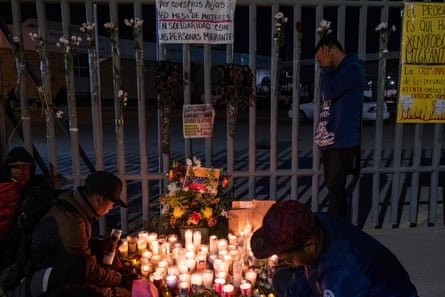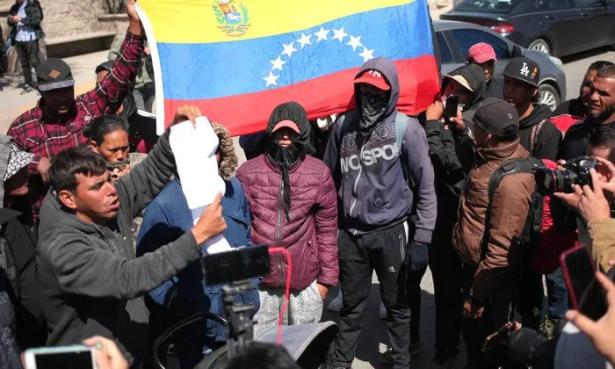A loud voice cut through the thick quiet of the night: “¡Justicia! ¡Justicia! ¡Justicia!” Frark Martín Pérez Pérez, 32, chanted angrily, and hundreds followed.
Justice is what the crowd of about 400 migrants from Latin America gathered to protest about on Tuesday outside the migrant processing centre in Ciudad Juárez, a Mexican city on the US border, where at least 40 were killed in a fire on Monday night.
Mexico’s president, Andrés Manuel López Obrador, blamed protesting migrants for causing the fire. Security footage published by El Universal showed two immigration agents leaving the scene after the fire began, while detainees were locked up and unable to escape the flames.
López Obrador on Wednesday vowed to bring to justice whoever was responsible for the deaths. An investigation is underway to determine what happened at the center, which he said employed staff from the government’s National Migration Institute (INM) as well as personnel from a private contractor.
“There’ll be no attempt to hide the facts, no attempt to cover for anyone,” the president said.
Rights groups have frequently flagged concerns about poor conditions and overcrowding in detention centres as the US and Mexico attempt to cope with record levels of crossings at their shared border.
The fire has highlighted the increasingly tough immigration policies that have been put in place by Joe Biden’s administration. Limits on the number of people allowed to seek asylum have left cities along Mexico’s northern border overwhelmed with people wanting to cross into the US, including many forced to sleep on the streets, inside churches or packed shelters.
Dozens of white daisies, rosaries, banners, and photographs decorated the metal fence that separated the centre from protesters. One by one, the national anthems of the countries of the victims were sung.
“In honour and grief of the fallen, they’re the martyrs of the immigrant population. We cannot forget them,” said Juan Pavón, 55, a migrant from San Cristóbal, Venezuela, who attended the protest with his two teenage daughters.

A vigil outside the immigration facility where at least 40 migrants died in a fire, in Ciudad Juárez, on Tuesday. Photograph: Guillermo Arias/AFP/Getty Images
Pavón and his daughters are homeless and awaiting the opportunity to request an inspection appointment with US Customs and Border Protection (CBP).
“We don’t know if they’re dead. They’re friends we met on this journey, family after all we went through,” said Pérez Pérez, a Venezuelan who emigrated from Perú in search of a better future for his wife and five children.
He was the only one of his friends not at the detention centre when the fire occurred, because he had run away when immigration authorities detained a group that was cleaning car windscreens at a busy intersection.
More than 24 hours after the incident, the victims’ names have not been revealed by authorities. Many, like Pérez Pérez, still wonder if their friends and family are among the dead or injured.
“Justice!” the crowd chanted after each name during a roll-call. Not knowing the victims’ names, a list of all the people detained at the time of the incident was read.
The protest remained peaceful, many sat on the street, closed off by local authorities to prevent the flow of traffic.
Xenophobia and abuse from Mexican authorities were a complaint throughout the day. Some of those detained on Monday claimed they were forcibly taken off the streets, without an explanation.
“What is the crime we committed?” said Katiuska Marquez, 23, from Estado Miranda, Venezuela. “They kept telling us this wasn’t our country, and that we weren’t allowed to do what we were doing.”
Marquez and her brother, Orlando Maldonado, 30, were asking drivers for money at an intersection when authorities detained them.
Marquez was released on Monday afternoon, shortly after being detained, because she has a toddler, and no children are allowed in the building. Her brother was inside when the fire happened. She still doesn’t know if he is alive.
“They’re killing us, but they’re also killing us psychologically,” said Elerith Medina, 31, from Cumana, Venezuela. “There’s immigrant children who have been detained more times than any criminal.”
Medina described her experience with the Mexican immigration system as “torture,” and called for President Biden to rethink immigration policies.
“I ask him for compassion,” Medina said. “There are many mothers who are being given appointments, but they’re not allowed to enter the country with their children.”
Frustration over appointments through the US’s CBP One app was high. The app is meant to serve as a one-stop shop portal for migrants with services and appointments tailored to their needs. However, its limitations mean families are unable to schedule appointments together and are forced to separate.
During the protest, the crowd cheered after Pavón suggested the app be disabled, and a better platform created. “That website is playing tricks with our minds,” Pavón said. “It must be suspended, cancelled.”
Many of the protesters planned to set up camp and stay the night outside the processing centre, saying they would remain peacefully until authorities from the US and Mexico gave them answers.
“Even though we’re a multitude, we’re still afraid,” said Sofía García, 29, from Puerto Cabello, Venezuela, who joined the protest.
García has been in Juarez for two weeks awaiting her inspection appointment with CBP, and says some locals have welcomed her, but she’s still faced discrimination.
“Why are we being asked to stay in this country to work and fight if we don’t have freedom?” García said. “I’d rather go back with nothing but alive.”
-
Reuters contributed reporting


Spread the word